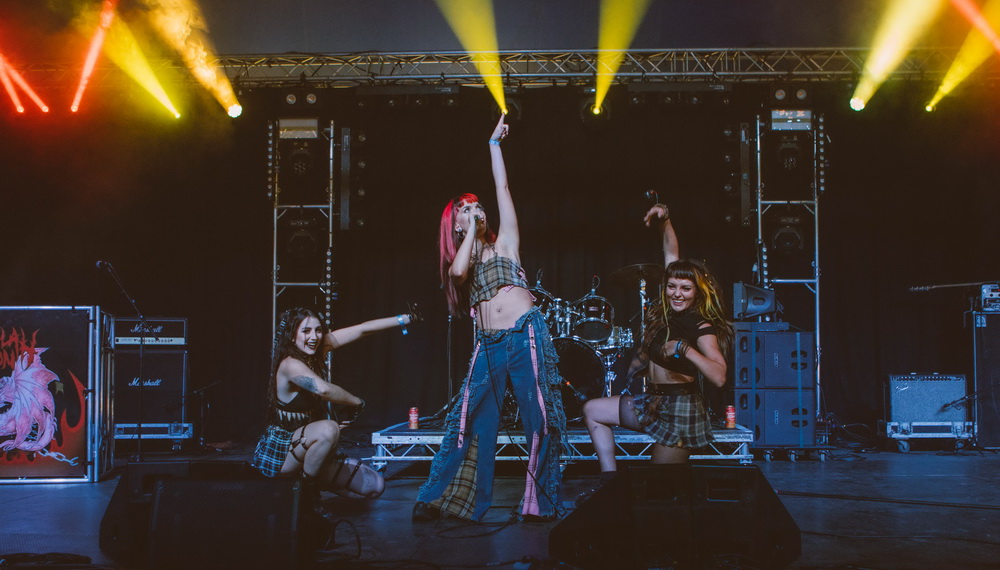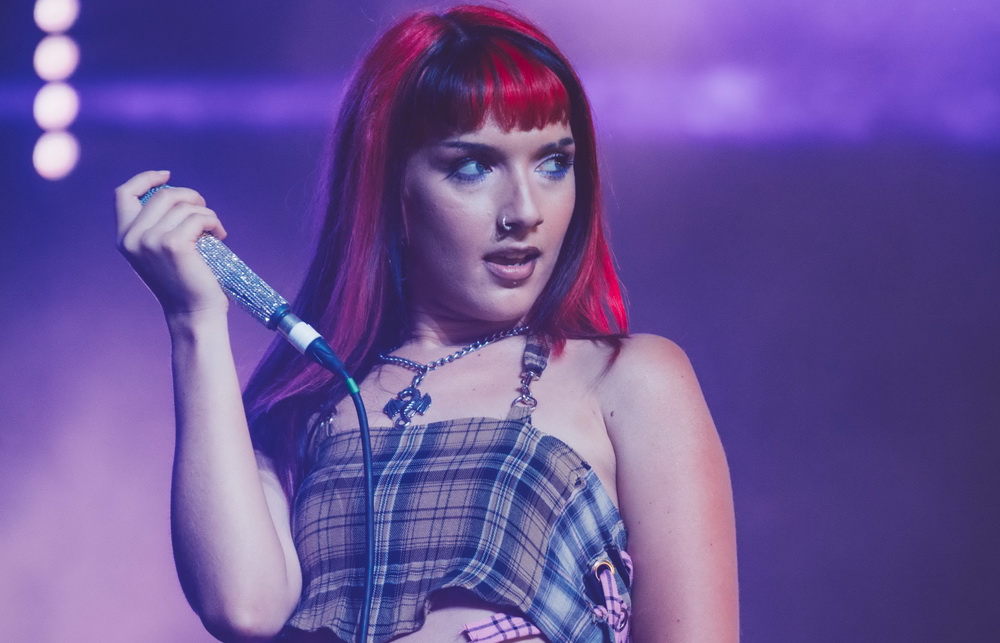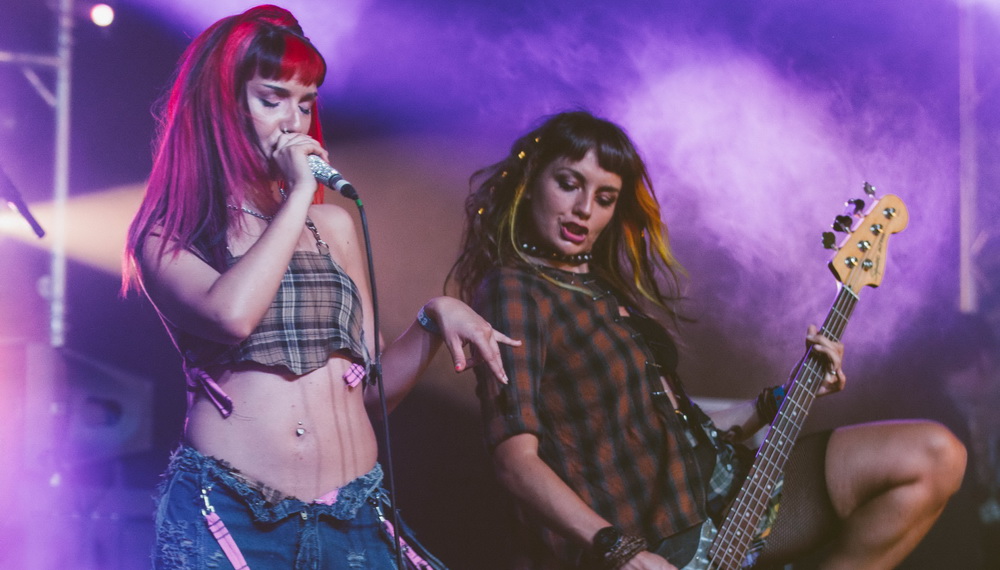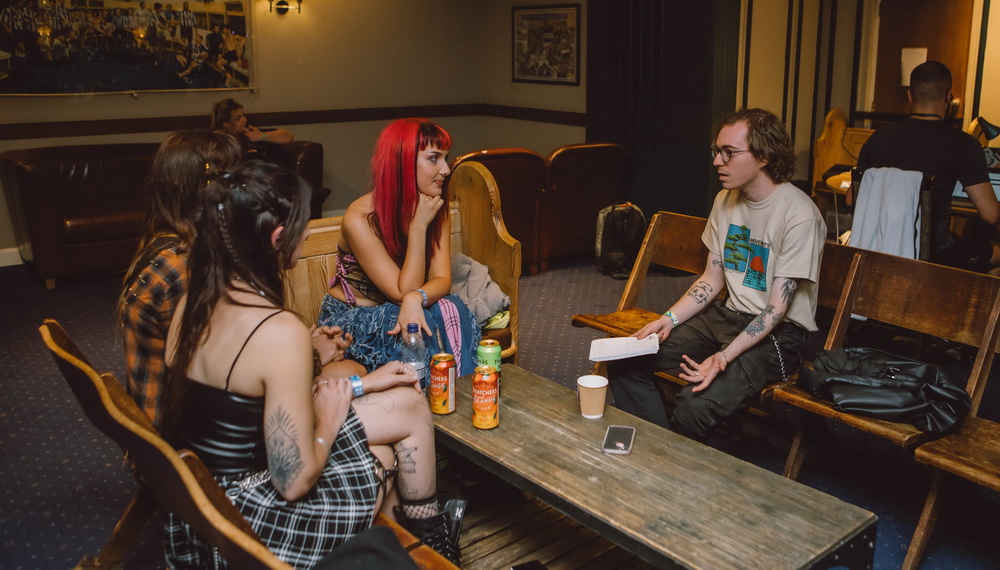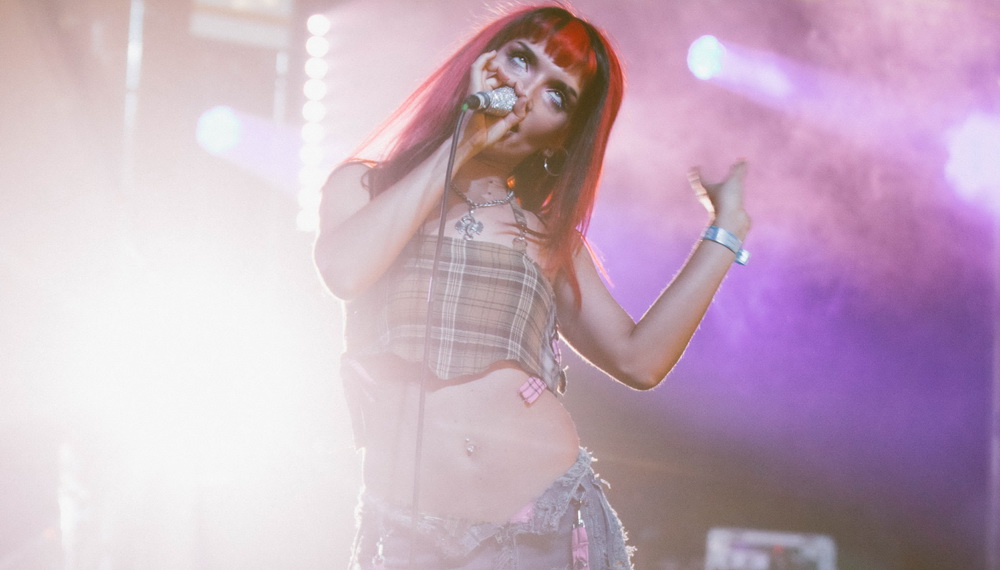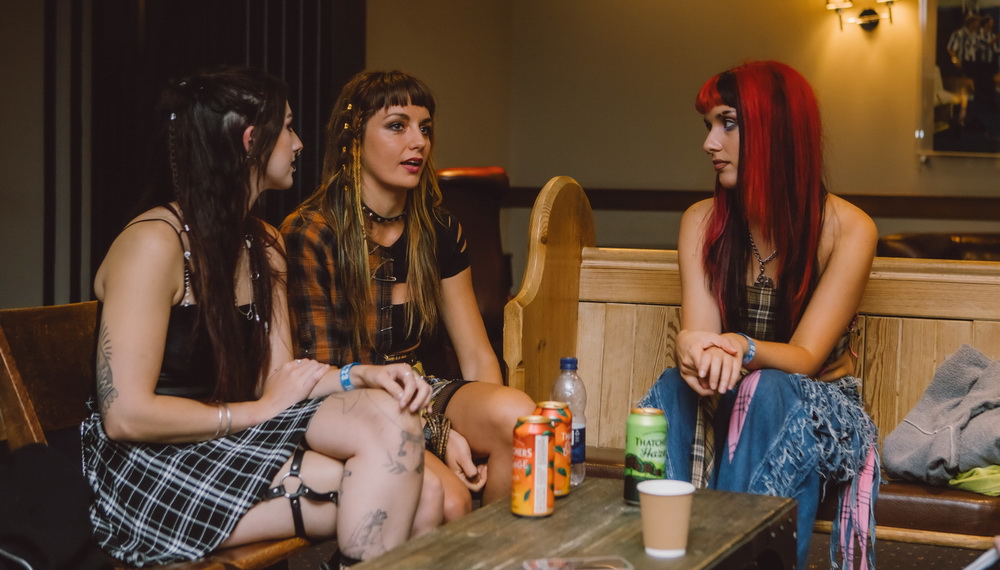Opening the first day of Sheffield’s biggest music festival, Tramlines, Delilah Bon brings the wake-up energy needed. ‘Brat punk influenced hip-hop’ is the genre coined by Lauren Tate, the creative mind behind the artist, which is substantially unique in the sea of indie and Brit-pop that festival goers usually expect from Tramlines. Her appearance certainly caught my eye, as Delilah Bon’s three-piece live act exuded fearlessness in their midday performance, unafraid to dance and twerk and scream Delilah’s defiant feminist lyrics to the event’s first arrivals. Up against the barrier, young people grooved and headbanged along.
Lauren Tate is well known in punk and alternative circles for previously fronting the band Hands Off Gretel. However, Delilah Bon was born after Lauren wanted to pursue the more overtly political side of her personality and has since enjoyed success on her landmark tracks ‘I Wish A Bitch Would‘, ‘I Don’t Listen To You‘, and of course, ‘Dead Men Don’t Rape.’
Delilah Bon is decidedly unapologetic in her songwriting and on stage, alongside her bassist Ruena, and DJ and general hypeman (I use that term gender-neutrally) Hela. Yet, talking with her reveals someone carefully sensitive to the issues that her audience faces, and her love for being creative beyond the goal of fighting misogyny and hate.
There are so many elements to your performance, but what I really want to talk about is your lyrics. I think lots of people are really drawn to your outspokenness, and I know you received backlash for this when you were fronting Hands Off Gretel. While discussions about women’s and queer rights are becoming more common in the mainstream, do you still experience this backlash?
Delilah: “I feel like I have my dream crowd, now, and it’s taken me ten years to find it. When I first started, it was mostly men aged 50 plus. And at the time, I was 17 I would say ‘Oh, I’ve got loads of people coming to see me,’ and I didn’t think about it. But then a few years went by and I started to worry, like, ‘Where are the girls? Where are the queer people? Why is it all these old men?’, and I would be arguing with them all the time. They would be trying to kiss me and pick me up.”
At 17?
Delilah: “At 17 to 24, I guess. And they would put their hands on me. And I didn’t know I was allowed to have boundaries back then because everyone else was fine with it. I would say, ‘I don’t want to hug,’ and they would kick off, ‘You don’t want a hug? You’ve changed! You’re not the same as you used to be, you used to let us hug you, now you’re a bitch!’. So, I began realising that this was not right. Other girl-bands that I played with, they were hugging them, kissing them and no one else seemed to be speaking out. So I decided, I’m going to speak out. I’m going to argue with all these old men. (laughs)
One time I played a gig and this man threw a drink at me. He threw his pint at me when I was … I think I was in Belgium at the time. He threw his pint at me, and I remember, I got the glass and threw it straight back at him. And I did so many things like that. I remember there was a guy who tried to jump over the barriers to grab me – he charged the barriers and I hit him in the face with my microphone.”
You hit him in the face?
Delilah: “Yeah. (laughs)
I was starting to physically fight back, and I was scared because there was no security. It was just me versus everybody. And I didn’t feel part of a scene, I didn’t feel safe. I didn’t feel good. And then I started Delilah Bon, and it’s like, ‘Right. I need to find my safe space, I need to find my girls and find the queer people, and boycott whatever that sexist attitude is.’ And I did it!”
Do you think being more outspoken and blatant in your stance has helped with that?
Delilah: “Yeah. I think that’s it. I think I’ve scared them away. And it’s a shame that you have to scare them away.”
Yeah, it’s kind of rock ‘n’ roll but you shouldn’t have to do that.
Delilah: “They should just respect you anyway, but I felt like I had to kick and scream for respect. Especially in the punk scene. But then – with a lot of the music I’m doing – the men don’t like it because they don’t like rap.”
Really? Men don’t like rap?
Delilah: “Yeah, they don’t like rap. They like the rock, but they don’t like the rap. So it’s like … good…” (laughs)
You have a range of influences. You have the rock and the metal side of things, but then you said one of your big influences is Cardi B.
Delilah: “Oh yeah.”
And I like that. You obviously have that alternative sound, but then the performances throw things off, where you guys are dancing, and the poles with the flares on the ends come out.
_______________________________
Delilah Bon speaks out unapologetically about such strong issues. I do not like saying the ‘R’-word, but I don’t want to play it down; ‘Dead Men Don’t Rape’ is such a strong title of a song, and what makes it even more interesting is how Delilah subverts your expectations in the verse, ‘They get so offended when I say dead men don’t rape’. She is confronting the initial idea of what that song is about. The title is a hook in itself.
_______________________________
Do you find it difficult or tiring now that the majority of your brand is rooted in bringing these issues to light?
Delilah: “It’s always come naturally. I think when I was younger it would have scared me, being so political, and being so outspoken. I would start to go inside myself. But now I think it’s all out there already. Whenever we play it live – every time we play that song – it’s just …”
Ruena: “The beast inside comes out. Genuinely, it makes you cry. On tour, we were crying so many nights, because you can see it on people’s faces, how much it means to them. And all of us have experienced things like that. It’s so cathartic and it’s like, ‘Finally, someone’s saying something for you.’ “
Hela: “I started off in the crowd watching Delilah Bon onstage and I thought that was powerful. And now, being on stage, seeing everybody else, and getting to do it with you guys, that’s next level.”
Delilah: ” ‘Dead Men Don’t Rape’ in particular is such a powerful one.
Whenever we play it live, I look into the crowd and there’s people screaming it that feel like, ‘Finally, someone is saying what I’ve always wanted to say.’ But then, I’ll meet other people, and maybe they’ve never said those words before, maybe they’re still afraid to say those words, and they just cry. And so it feels like a superpower, being able to speak for so many people. I think a lot of people are scared to do it, so I throw myself in there – I just do it!”
You’re connecting with those people through your music, but do you have any advice for those who maybe want to come out of their shells but are struggling?
Delilah: “For me, speaking about things that have happened in my life, writing has been the best thing. I wrote a zine – which is like a mini book – just about things that had happened and things that I felt too shy or too embarrassed to open up about. Or things that I still felt shame about. Things that I didn’t want to tell my mum. I wrote about it. It’s so much easier to write it all down and let someone read it, sometimes. And words are scary – I’m bad at talking, that’s why I sing.
I struggle with interviews because they want me to speak about my songs, and that’s the part I struggle with, that’s why I sing. So, when I sing, I can really think about my words, and I think, in music, in art, and all those kinds of areas, that’s where you can express yourself in your own little bubble, and when you’re ready, you can share it with people.”
I suppose some people can do it non-verbally, as well, like through painting. Do you write stuff down by hand? Or do you type?
Delilah: “A bit of both.”
Do you find that matters?
Delilah: “Erm…”
Ruena: “I like writing in pen.”
Delilah: “See, I’ve been cheating lately.”
Ruena: “Have you been on the computer?” (laughs)
Delilah: “No, no – worse: phone notes!”
Ruena: “Voice notes – that’s another one.”
Delilah: “I used to write my lyrics on my laptop. So, when I’m recording myself in my studio, I’d have my laptop. But then my eyes would be killing me because I’d be trying to look down at my laptop and sing like that. So then, I’d put them on my phone notes so I can hold them when I’m singing. I don’t always sing while reading, but sometimes if I’ve just written something I’ll read it in front of my face.”
Do you guys like doing that as well, then? Like 2, you said you like writing stuff down, do you find it cathartic?
Ruena: “Definitely. Writing something down – it just gets it off your chest. Because when everything is in your head – living in your head – you can obsess over it, and it can overwhelm you. But even if no one sees it, just getting stuff out on paper – or on a voice note or a computer, however you need – just saying it however you need gets the weight off. And then you might feel like you want to share, but you don’t have to. It should be whatever feels right for you.”
Hela: “For me, not from a music project point of view, it’s about putting on a really sad song and having a dance. That’s getting the feels out for me.”
Ruena: “There you go – however you see fit!”
Do you think artists have a duty to use their platform to talk about social issues and politics?
Delilah: “I think so. I think some artists do, some artists don’t. But I think in the social media age we’re in, it’s so easy to do it. It’s so easy to share something. My main thing that I have been sharing recently is all about trans people because I see other artists that are just like, full TERF [Trans Exclusive Radical Feminist]. They’re just excluding trans people. And I see them using their platforms to exclude trans people. They’ve got trans fans that see that.
For me – if I’m getting on stage, especially with what I’m doing with women empowerment – sometimes I worry they might fear that women empowerment might exclude trans people, so they might not know for sure, and think, ‘I don’t know if this singer accepts me as a fan.’ Or if you’re non-binary, ‘Will this singer accept me?’ So, I think, for me to put something out there – the messages that I get back – people are like, ‘Thank you so much.’ All it takes is to put something up there, show support, and I think it makes such a difference to people.”
Do you find you get a lot of good feedback about that from fans?
Delilah: “Oh yeah.”
Ruena: “I think, it’s not so much about having fans, it’s community. I think they get so much out of … Honestly, she does so much – you talk to everybody. [Delilah laughs as Ruena talks directly to her] For me, it’s such a nice thing to see, because you give so much of your life and time to other people. Every message, you respond to. Every comment, you respond to. And it’s sad stuff, a lot of what people are saying. And you’re carrying all this extra weight for people, but you’re always there – you’re always there for people. And I think people love that about you. And I think it helps them to get to know you more, as well. As a person, as an artist. I think it just makes the whole thing stronger.”
Delilah: “It does. It’s a big thing to meet the fans after a gig. We played in London and I had a queue for two hours. The entire crowd queue to meet me afterwards, and I hugged everyone! And everyone’s always got a story, like ‘Your music helped me at this time,’ or ‘This happened to me, and your music helped.’ It’s always the saddest stories, as well, so I take a lot in when I meet people.”
“And the security was like, ‘You’ve got to wrap it up now’, but it’s like, ‘I can kind of hear what you’re all talking about so I feel a bit bad telling you to hurry up.’ “
You have a lot of positive stuff going on as well, especially in your performance. I like the bubble gun. I can tell you’re having fun with it, as well.
Hela: “I mean, we just go and have fun. Like, if we’re having fun, then everyone else is going to have fun!”
Ruena: “It’s a big part of it.”
Delilah: “There’s obviously the punk element of it, which is the politics and the anger that I’ve got in my voice and my lyrics, but then I want to make it accessible. So, if people are not really into punk, and if they’re not really that angry about politics, they can come in and have fun. There are songs where we’re like, ‘We’re going to give it a break now, and we’re going to have fun on this song.’ “
Ruena: “You need a bit of everything. When you’re aging and catharting all this time, you need a bloody break!” (laughs)
Delilah: “You do need a break. It keeps it fun for us as well. It’s not too straining on my voice, either.”
I think it’s good to show that more personable side of yourself, as well. I have conversations with my mum and I’m like, ‘Hey, I just discovered this metal band and they’re amazing,’ and she just thinks they’re crazy. But then you meet the people behind the art and everyone is just kind of getting on and doing their own thing, and the egos really aren’t as high as they’re made out to be, a lot of the time.
You did an interview a while back and the magazine described you as a ‘guitarist’, but you do everything. You’ve already talked about the songwriting and production. What do you consider yourself?
Delilah: “I started as a singer. That’s all I wanted to be, a singer. I never wanted to be a songwriter, I just wanted to sing other people’s songs. [Ruena stage-whispers ‘What!’] I know! I know! Crazy! I didn’t really care about songwriting, and then this guy started writing songs for me, and I thought ‘I hate these songs.’ I thought ‘Crap! I need to write my own because this doesn’t represent me at all! It’s totally the wrong style.’ And so I started writing my own songs.
And then, when it came to production, other men would then produce my songs and I wouldn’t like them. And I would think ‘I need to now produce my own songs.’ All I wanted to be was a singer, but I’ve ended up a singer, a songwriter, producer.”
Did your role as producer come into play when you were in Hands Off Gretel or is it new with Delilah Bon?
Delilah: “I started recording demos with Hands Off Gretel. And then, when I went in to record the album, I would always reference the demos and say, ‘I just kind of like the demos more.’ And then the producer would argue with me, like ‘I’m the producer. You’re the singer. You sing, I produce, stop getting involved.’ And it used to drive me insane because I have so many ideas. But, I properly started producing around lockdown. Lockdown did it – it was all the time I had.”
From talking to a lot of other DIY bands, I know it’s so hard to get everything off the ground when you have all this other stuff going on. You need to have a job and an income, look after your health, etc. Were you worried about burnout and having other responsibilities?
Delilah: “Nope! (laughs) No, not really, I just enjoy it so much. I think, sometimes, with Hands Off Gretel, I got burned out. I didn’t want to do it anymore. When it came to playing gigs and writing the album, I just lost interest. And that was a hard thing to admit, but around lockdown, I think it became obvious. I thought ‘I’m not enjoying it, I’m not in my element.’ I started to think, “I need to enjoy it, I must enjoy it. It has to be fun, or else what’s the point?’
With Delilah Bon, I’m my own boss – no one’s telling me what to do. If it’s not fun, I have to make it fun. So far, I’ve had fun the entire time.”
‘If it’s not fun, I have to make it fun.’ I’ll have to remind myself of that one.
The last thing I wanted to ask you about was something you mentioned in another interview. You said you wanted to explore other forms of media. You did some horror-themed music video work.
Delilah: “Oh, yeah!”
You also said you wanted to have a comic book series and star in films. Is that something you want to explore more? Can we expect to see that from you?
(laughs)
Delilah: “Probably not. There’s not enough time to fit it all in. I think, my plan is, I’d like to be a famous singer first – that’s step one. (laughs) And then, we’re going to do some films. I can’t act, but…”
Ruena: “You can! We’ve made films!”
Hela: “We have!”
Ruena: “They didn’t see the light of day, mind.”
Delilah: “The more I think about it – I don’t think I’m made for Hollywood, I think I’m made for the pantomime.”
Hela: “Christmas panto, it’s happening!” (laugh)
Delilah: “I could do really good theatre stuff. I can do ‘evil woman’. (laughs) I can do evil woman voices.”
Hela: “She has one role in Hollywood!”
Ruena: “She can do a scary voice.”
Would that be tied to Delilah Bon’s personality and brand?
Ruena: “I think my favourite thing about Delilah Bon is that anything goes. What’s coming next?”
Hela: “Who knows?”
Ruena: “Are you doing a film after the album? Do it, let’s go for it. You’ve got so much freedom, you can do whatever you want with it. You’ve got complete creative freedom.”
Delilah: “Delilah Bon could be anything. Whatever I decide.”
*****
It’s great to see a more mainstream festival like Tramlines promoting artists with important messages such as Delilah Bon, but I want to see her higher up the bill, next time. We still face the issue of UK festival line-ups being overwhelmingly male-dominated (just look at the weekend’s headliners), and a large part of Delilah Bon’s act that appeals to me is Delilah’s transparent stance on such issues. Combined with the bad weather, this meant we almost didn’t get to see Delilah Bon perform at all – the opening of the festival was pushed back on each day. On the Sunday, some early performances were cancelled last-minute. We need women and other minorities to have safe spaces and representation at these festivals, and while it is good to see the event’s organisers leaning further into this, there is still a long way to go.
I had a wonderful time talking with the three and very much appreciate their openness when talking about sensitive issues. As I frequently cover women and queer artists and their struggles, I feel exceptionally lucky to have interviewed someone as experienced and influential as Delilah Bon.
*****
Photos: Courtney Turner
Photo gallery
*****
Delilah Bon pages
 Messed!Up
Messed!Up

